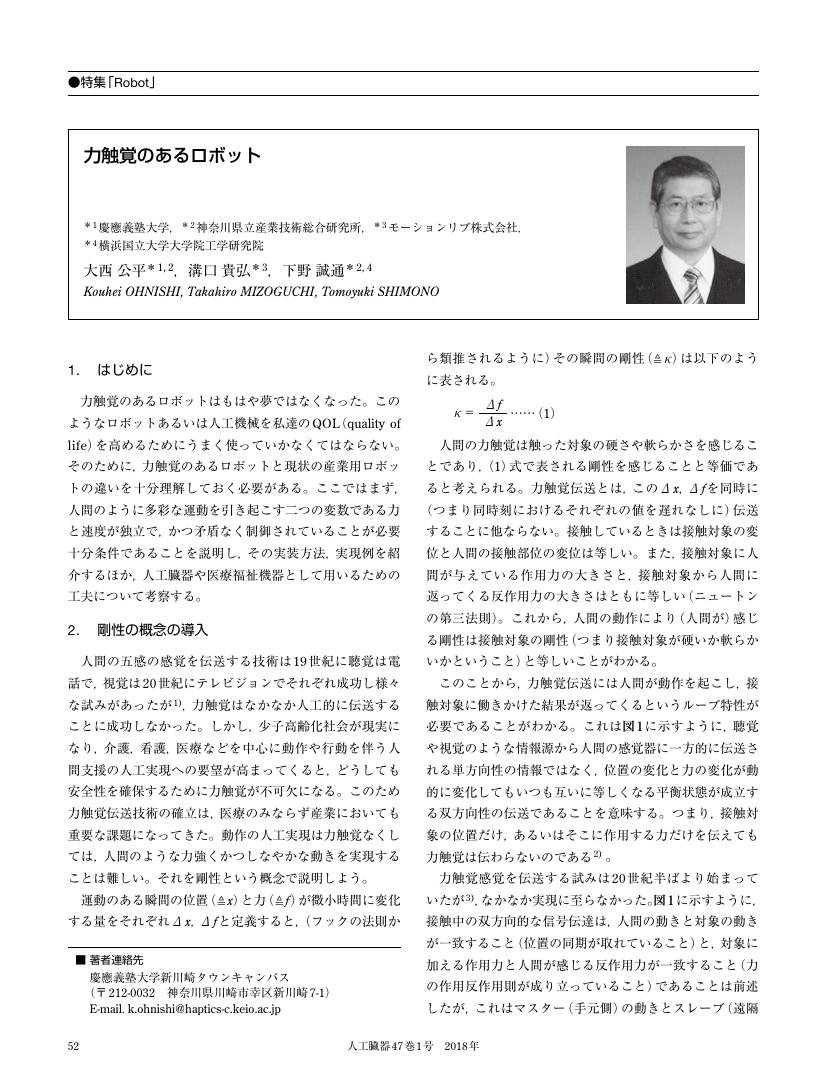1 0 0 0 OA 力触覚のあるロボット
- 著者
- 大西 公平 溝口 貴弘 下野 誠通
- 出版者
- 一般社団法人 日本人工臓器学会
- 雑誌
- 人工臓器 (ISSN:03000818)
- 巻号頁・発行日
- vol.47, no.1, pp.52-57, 2018-06-15 (Released:2018-09-15)
- 参考文献数
- 6
1 0 0 0 バイラテラル制御による環境剛性の動的推定法
- 著者
- 武井 貴義 下野 誠通 大西 公平
- 出版者
- The Institute of Electrical Engineers of Japan
- 雑誌
- 電気学会論文誌. D, 産業応用部門誌 = The transactions of the Institute of Electrical Engineers of Japan. D, A publication of Industry Applications Society (ISSN:09136339)
- 巻号頁・発行日
- vol.129, no.6, pp.601-607, 2009-06-01
- 被引用文献数
- 5 4
Recently, minimally invasive surgery (MIS) has become apparent. Research has been performed on surgical robots needed in MIS. In the case of MIS, it is effective to express environmental impedance as numerical data in order to preserve it for establishing standard reference values of the conditions of internal organs. In this paper, we propose a novel method for the estimation of stiffness in real environments in which bilaterally controlled robots are needed. By using the proposed method, environmental stiffness can be estimated dynamically regardless of the initial position of slave system. The viability of the proposed method is confirmed from the experimental results.
1 0 0 0 モード仕事率に基づく触覚動作認識の一手法
- 著者
- 笠原 佑介 下野 誠通 桑原 央明 佐藤 正尭 大西 公平
- 出版者
- The Institute of Electrical Engineers of Japan
- 雑誌
- 電気学会論文誌. D, 産業応用部門誌 = The transactions of the Institute of Electrical Engineers of Japan. D, A publication of Industry Applications Society (ISSN:09136339)
- 巻号頁・発行日
- vol.130, no.4, pp.477-484, 2010-04-01
- 被引用文献数
- 2
Motion recognition based on sensory information is important for providing assistance to human using robots. Several studies have been carried out on motion recognition based on image information. However, in the motion of humans contact with an object can not be evaluated precisely by image-based recognition. This is because the considering force information is very important for describing contact motion. In this paper, a modal-power-based haptic motion recognition is proposed; modal power is considered to reveal information on both position and force. Modal power is considered to be one of the defining features of human motion. A motion recognition algorithm based on linear discriminant analysis is proposed to distinguish between similar motions. Haptic information is extracted using a bilateral master-slave system. Then, the observed motion is decomposed in terms of primitive functions in a modal space. The experimental results show the effectiveness of the proposed method.
